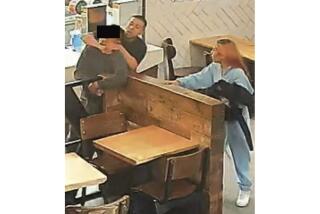$32,000 Was Paid to Mexicans Who Seized Key Drug Case Figure
Federal prosecutors said Wednesday that U.S. officials paid $32,000 to six Mexican nationals who handcuffed and blindfolded a suspected Mexican drug trafficker before pushing him across the international border and into the custody of U.S. marshals.
The latest revelation in the case, which has stirred considerable controversy on both sides of the border, was contained in a five-page declaration filed by the office of U.S. Atty. Peter K. Nunez. Nunez’s office acted after U.S. District Judge J. Lawrence Irving ordered prosecutors Friday to provide him with information about the government’s role in the abduction of Rene Martin Verdugo.
According to the document, officials from the Drug Enforcement Administration and the U.S. Marshal’s Service met in December to discuss the possibility of having Verdugo arrested in Mexico by Mexican lawmen. The paper, which is signed by Assistant U.S. Atty. Michael Lasater, says that in January personnel from the Marshal’s Service contacted Mexican police in Mexicali and asked them if they could arrest Verdugo and deliver him to U.S. authorities. None of the officials is named.
The affidavit claims that the Mexican officials said that Verdugo’s arrest could be accomplished, presumably without an extradition request, as long as there was an outstanding U.S. warrant for his arrest. Verdugo was indicted Aug. 3 on marijuana smuggling charges.
But Mexican federal prosecutor Francisco Acevedo Guzman said in a telephone interview from his Mexicali office Wednesday night that unless U.S. authorities could produce Mexican legal documents authorizing Verdugo’s arrest and transfer to U.S. custody, at least one Mexican law was probably broken.
“Unless they can produce this documentation, this abduction was an illegal kidnaping, whether it was done by (Mexican) police or civilians,” Acevedo said.
On Jan. 24, “a team of approximately six Mexican law enforcement personnel arrested Verdugo in San Felipe,” said the court papers. Verdugo was then “handcuffed, blindfolded and placed in the back seat of an automobile” and driven to a spot about eight miles west of the Calexico port of entry where he “was met by U.S. marshal’s personnel” and taken into custody.
The document claims that the six men were Mexican police officers, but Mexican government authorities familiar with the case have told The Times that only four of the men were State Judicial Police officers and the other two were civilians. Mexican police authorities have said that the four officers were summarily fired Jan. 15, nine days before Verdugo’s abduction, when they failed to return to work after three days.
Verdugo, who claims to be a Baja California land developer, said at a court hearing Jan. 29 that he was blindfolded, handcuffed and kidnaped by a group of men who drove him from San Felipe to Mexicali, where they shoved him through a hole in the fence into the arms of waiting U.S. lawmen.
Assistant U.S. Atty. Michael Lasater said then that he had no knowledge of any events like those described by Verdugo. Spokesmen for the Marshal’s Service and the Drug Enforcement Administration also denied having any knowledge of an abduction and said it is against the policies of both agencies to participate in or promote the kidnaping of a foreign national in his own country.
Initially, spokesmen for the Marshal’s Service and the U.S. Embassy in Mexico claimed that Verdugo was arrested at the Calexico border crossing when he attempted to return to Mexico after a trip to the United States.
Michael Pancer, attorney for Verdugo, said that the document filed in court “clearly raises more questions than it answers.” Pancer charged that some of the information is not true.
According to the court papers, the six men were paid the $32,000 on Jan. 28, four days after the abduction, and after they and their families received death threats.
“Based on our information, the police officers were offered money prior to the kidnaping,” Pancer said. “They refer to this as an arrest in Mexico, but it’s a kidnaping. There was no legal process by which he could be arrested in Mexico.”
The six men and their families--29 people altogether--received special visas on Feb. 2 to enter the United States, U.S. immigration officials said.
Drug Enforcement Administration sources have said that Verdugo has information about the murder of DEA Agent Enrique Camarena. DEA sources told The Times that Verdugo was present when Camarena was tortured at the Guadalajara home of a Mexican drug trafficker.
More to Read
Sign up for Essential California
The most important California stories and recommendations in your inbox every morning.
You may occasionally receive promotional content from the Los Angeles Times.










